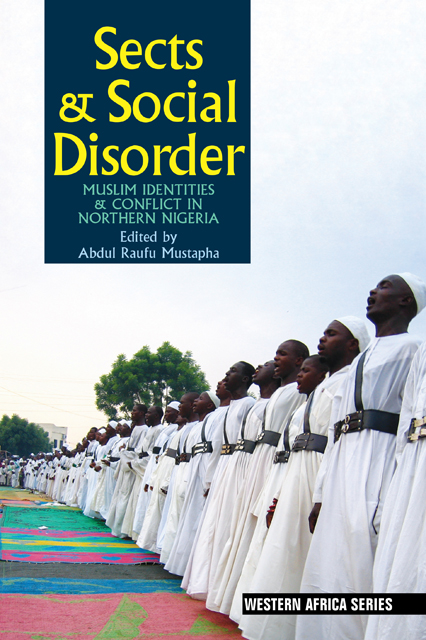Book contents
- Frontmatter
- Dedication
- Contents
- List of Maps, Figures & Tables
- Notes on Contributors
- Foreword by Muhammad Sani Umar
- Acknowledgements
- Glossary
- 1 Introduction: Interpreting Islam: Sufis, Salafists, Shi’ites & Islamists in northern Nigeria
- 2 From dissent to dissidence: The genesis & development of reformist Islamic groups in northern Nigeria
- 3 Contemporary Islamic sects & groups in northern Nigeria
- 4 Experiencing inequality at close range: Almajiri students & Qur’anic schools in Kano
- 5 ‘Marginal Muslims’: Ethnic identity & the Umma in Kano
- 6 Understanding Boko Haram
- 7 Conclusion: Religious sectarianism, poor governance & conflict
- Index
Foreword by Muhammad Sani Umar
Published online by Cambridge University Press: 24 February 2023
- Frontmatter
- Dedication
- Contents
- List of Maps, Figures & Tables
- Notes on Contributors
- Foreword by Muhammad Sani Umar
- Acknowledgements
- Glossary
- 1 Introduction: Interpreting Islam: Sufis, Salafists, Shi’ites & Islamists in northern Nigeria
- 2 From dissent to dissidence: The genesis & development of reformist Islamic groups in northern Nigeria
- 3 Contemporary Islamic sects & groups in northern Nigeria
- 4 Experiencing inequality at close range: Almajiri students & Qur’anic schools in Kano
- 5 ‘Marginal Muslims’: Ethnic identity & the Umma in Kano
- 6 Understanding Boko Haram
- 7 Conclusion: Religious sectarianism, poor governance & conflict
- Index
Summary
I am pleased to introduce this volume of richly documented and insightfully amazing case-studies of Islamic movements and their historical background, social origins, religious beliefs and practices, and their emergence in the economic and political context of Nigeria. The valuable contributions of the individual chapters and the volume as a whole are better appreciated in light of the older literature on Islamic movements in Nigeria, and the more recent literature on violent conflicts, security studies and inter-group relations among Nigeria’s ethno-religious communities, especially in the context of what one of the authors in this volume terms ‘fractious politics’, since Nigeria’s return to democracy in 1999. In contrast to the disciplinary orientation in much of the literature on these themes, the present volume stands apart by its sustained and thorough engagement with the different disciplinary orientations, thereby enriching its contributions and enhancing the analytical bases for its policy recommendations.
Broadly, Islamic movements in Nigeria have been studied in waves that can be traced to the early colonial era, or even the travelogues of European explorers in the eighteenth and nineteenth centuries. Social scientists have often focused on the political and sociological dimensions of Islamic movements, without any sophisticated appreciations of the importance of the religious dimensions, often treated as an epiphenomenon that can be safely discounted. Similarly, humanities scholars, particularly historians and specialists of Islamic and Arabic studies, are only slightly better in their engagement with the religious dimensions. More than the social scientists, scholars of the humanities have been more attentive to the relevance of the longstanding traditions of Islamic movements dating back to the jihad of Shaikh ‘Uthman dan Fodio at the beginning of the nineteenth century, and then going forward all the way to the Maitatsine uprisings in the 1980s and 1990s, and the rise of Boko Haram insurgency at the turn of the twenty-first century. Although laudable, some of the historical tracings have not captured discontinuities and novel developments in the longue durée of the evolution of Islamic movements in Nigeria.
Over the last two decades, inter-group relations among the numerous ethno-religious communities in Nigeria have become more and more characterized by violent conflicts.
- Type
- Chapter
- Information
- Sects and Social DisorderMuslim Identities and Conflict in Northern Nigeria, pp. xiii - xviPublisher: Boydell & BrewerPrint publication year: 2014



